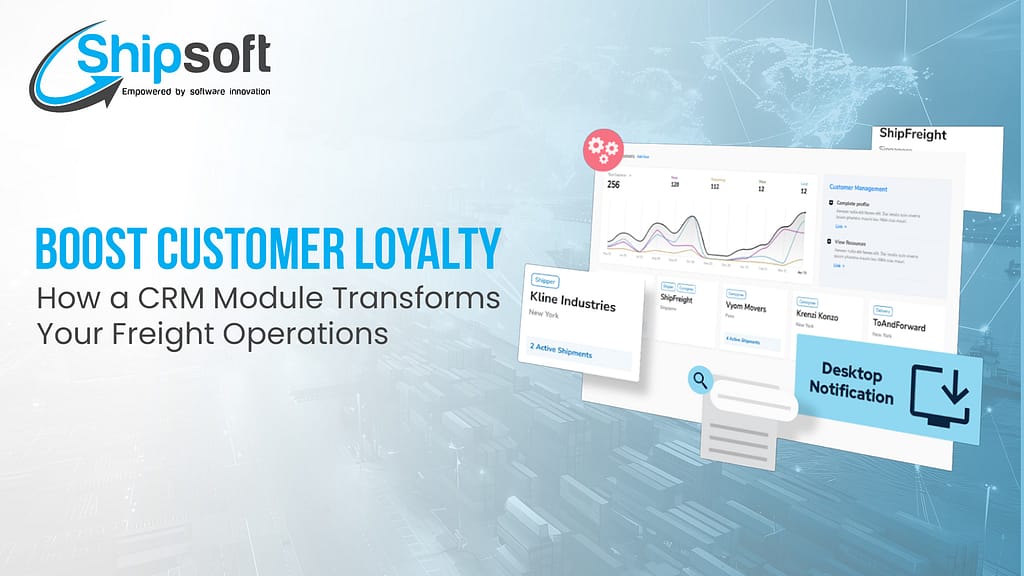
In the fast-moving world of logistics and freight forwarding, customer loyalty is more than a goal—it’s a necessity. Companies striving to maintain a competitive edge must focus not on the physical movement of goods but also on building lasting customer relationships. This is where Customer Relationship Management (CRM) plays a transformative role.
Modern freight forwarding companies now leverage customer relationship management software to improve communication, build trust, and streamline operations. When combined with a robust transport management system or freight forwarding software, CRM helps deliver a personalized experience that keeps customers coming back.
The Role of CRM in Freight Operations
CRM is not just a contact database; it’s a strategic tool that provides a 360-degree view of your customer. In the freight industry, this means having access to:
- Shipment history
- Preferred delivery methods
- Contact preferences
- Feedback and complaints tracking
This detailed insight helps businesses tailor their services, improve response times, and offer proactive solutions—all crucial for increasing customer satisfaction and retention.
CRM and the Logistics Ecosystem
When integrated with your logistics management software, CRM becomes even more powerful. For example:
- Your shipment management system can trigger alerts in the CRM when delays occur.
- Customer service teams can use these alerts to provide real-time updates, reducing frustration.
- Marketing teams can personalize offers based on shipping frequency and preferences.
- These seamless connections ensure a consistent and responsive experience throughout the supply chain.
Integration with ERP and Other Modules
To fully realize the potential of CRM, integration with ERP software solutions is essential. This creates a centralized platform where all departments-sales, operations, accounts, and customer service-can collaborate.
A CRM integrated with warehouse ERP systems and transport management systems ensures that:
- Inventory levels are visible to sales teams.
- Transport schedules are aligned with customer needs.
- Financial teams have immediate access to billing history and outstanding payments.
- Such comprehensive coordination enhances operational efficiency and elevates customer satisfaction.
How CRM Drives Customer Loyalty
- Proactive Communication: Automated notifications, personalized follow-ups, and prompt responses to queries build trust.
- Data-Driven Service: Use historical data to predict needs and make informed recommendations.
- Feedback Loops: Track and resolve complaints swiftly, showing customers their voice matters.
- Tailored Offers: Create loyalty programs or discounts based on customer behavior.
With business management software that includes CRM, you shift from reactive support to proactive relationship-building.
Best Practices for CRM in Freight Operations
- Customize Workflows: Adapt your CRM workflows to fit freight operations, including quote generation, booking, and document sharing.
- Train Your Teams: Ensure every department understands how to use CRM effectively.
- Measure Results: Track KPIs like customer satisfaction scores, repeat bookings, and response times.
Adopting the best supply chain management software means more than choosing a tool—it’s about selecting a partner that grows with your business.
Why ShipSoft’s CRM Module Stands Out
ShipSoft’s CRM module is purpose-built for freight forwarding. It integrates seamlessly with other modules like the warehouse management system, transport management system, and shipment management system. This ensures:
- Fewer communication gaps
- Automated customer updates
- Easier document access for clients
This interconnected structure is what makes it one of the best software for supply chain management available today.
Final Thoughts
In a global economy where customer expectations are higher than ever, loyalty is earned through service, speed, and consistency. By implementing customer relationship management solutions tailored for logistics, freight companies can differentiate themselves from competitors and foster long-term success.
Investing in the right customer relationship management software is not just about managing data—it’s about managing relationships. And in the freight industry, strong relationships drive strong business. Whether you’re searching for the best supply chain software or an all-in-one business management software, CRM should be at the heart of your strategy. It’s the key to transforming how you serve, retain, and delight your customers.
